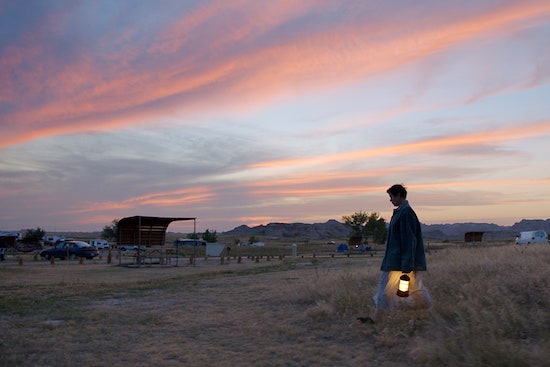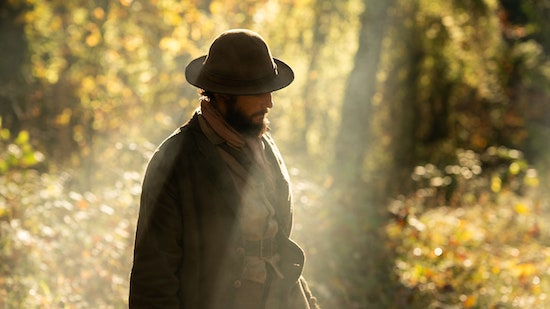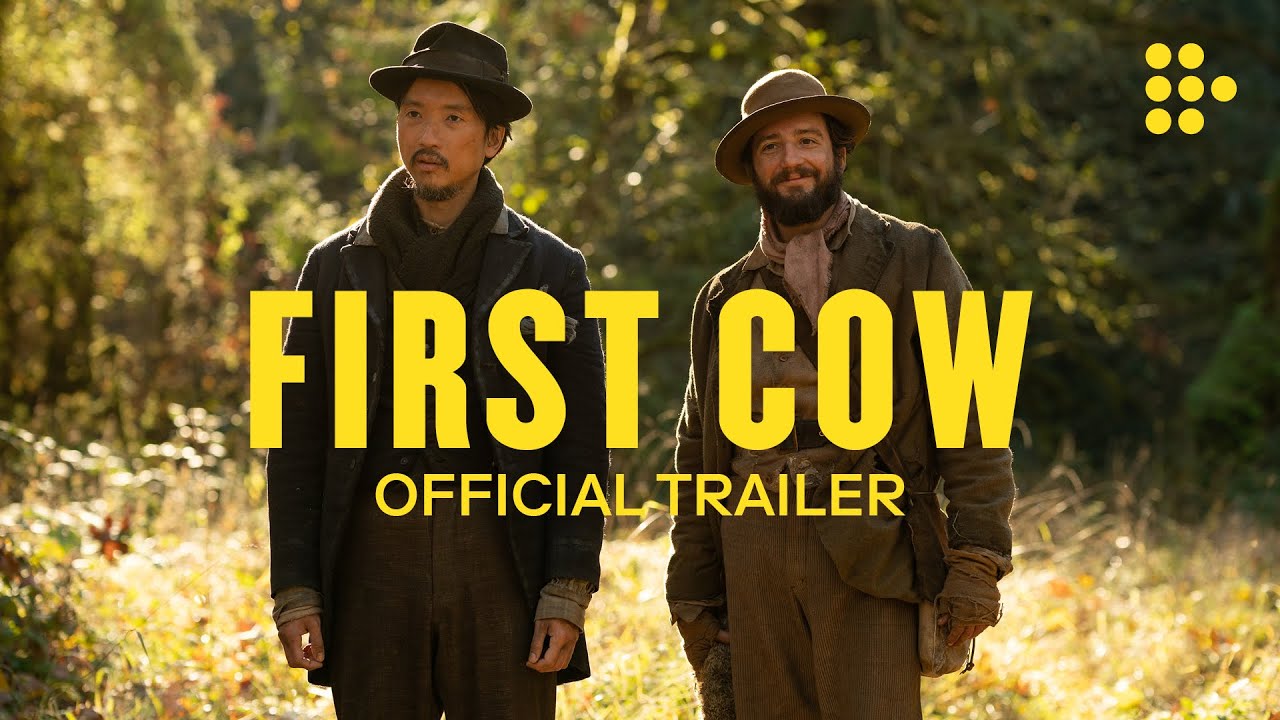Several men sit at a bar, in a frontier settlement somewhere in Oregon. The Columbia river gushes nearby. They are talking about a cow, the first to be brought to the settlement via the river. Her mate and calf have not survived the journey. “This ain’t a place for cows,” one man says. “Well, it’s no place for white men either,” another replies. Their conversation feels searingly ironic when reflecting on a country whose cinematic history is dominated by white men, and whose national dish is the hamburger. Yet this is also a reminder that much of America’s multinational colonial history has been erased.
While First Cow is set in the 1800s, it has uncanny resemblances to two other recent films set nearer the present, Nomadland and Minari. Each film nods heavily toward the most quintessential of American film genres: the Western. With recent releases such as News of the World and Concrete Cowboy making their mark on the canon (the first is a fairly traditional frontier western, while the second is set in a modern-day Philadelphia community of Black cowboys), in First Cow, Nomadland and Minari, the influence of the Western is more gentle, less overt. These films tell well-trodden stories of American immigration, but from a marginalised perspective. In doing so, they also redefine America’s relationship with the natural world.
The Western has experienced many iterations, from the classic (John Ford and Clint Eastwood its best-known auteurs) to the “acid” and the “pot” (El Topo, garishly avant-garde and psychedelic, versus McCabe & Mrs. Miller, more subtly subversive). The political upheaval of ‘60s and ‘70s America led to a surge in revisionist westerns, which disrupted prior narratives of the cowboy as the strait-laced “good guy” and Native Americans as the bad. In academic studies of westerns, critics have long suggested that “settler narratives” in classic westerns perpetuate heteronormativity. One myth is that there is a “civilizing” process in settler colonization, after which heterosexual marriage ushers in western society. The idea that only white men partook in settler colonialism is another myth. As academic Jafri Beenash writes in Brown Cowboys on Film: Race, Heteronormativity and Settler Colonialism, only relatively recently have studies of westerns turned their attention to minorities.
Following suit, American films are finally portraying minorities in westerns and telling more honest stories. First Cow, Minari and Nomadland are complicating this binary narrative of “cowboys and Indians”, exploring the myth of the frontier and American Dream. As we reach the brink of another recession, they are also critical of the capitalist structures underpinning America’s history. Chloé Zhao’s Best Picture winner Nomadland follows Fern (Frances McDormand), a bereaved woman in her sixties, as she and her van drift around half-inhabited campgrounds and tourist sites, in and out of work. She is one of many forced to live on the road after the 2008 recession. Made on a pinched budget, with amateur actors playing their real-life selves alongside McDormand, this sense of economic sparseness bleeds into the film. Fern’s travels around the American planes are half out of necessity, half desire. What Fern is doing “is not that different than what the pioneers did”, her sister says. There is the sense that the frontier never truly disappeared.
While Nomadland voyages across Arizona and the west, the Midwest is Zhao’s prior territory. Her debut Songs My Brothers Taught Me (now streaming on MUBI) headed to the Pine Ridge Indian Reservation in South Dakota, near where she would film her next feature, The Rider. The first introduces a Lakota Sioux family, while the second stars Sioux bronco rider Brady Jandreau. Critics such as Alison Willmore suggest that Zhao’s multinationalism (born in Beijing, educated in the UK and now living in the US) has lent her a new, authentic insight into American life – Zhao has commented that the America she encountered is “not what I saw in the movies.”

First Cow director Kelly Reichardt is also no stranger to the Western, yet her latest feels a far cry from her high-tension Meek’s Cutoff. Since that release in 2010, both US cinema and film worldwide has showed signs of increasing honesty around colonial violence: Jennifer Kent’s The Nightingale (set in Tasmania), Scott Cooper’s Hostiles and News of the World included. ( Paul Greengrass’ News of the World attempted more nuance in its American frontier portrayal, but opted to cast Tom Hanks as saviour, rather than return a Kiowa-raised girl to her home.)
With its tinkling guitar music, First Cow may be one of the most tranquil films about American colonialism ever made, in which Indigenous and settler communities appear to co-exist in relative – perhaps deceptive – harmony. The film isn’t entirely free from conflict, though. Cookie, a cook, and King Lu, a business-minded man from China, dream of setting up their own bakery. But resorting to theft to spur their dream along has potentially grave consequences.
The American Dream, as Katie Goh also noted for i-D magazine, is also integral to another of this year’s biggest films. Minari’s premise feels familiar: a family move to a dilapidated home in hope of a fresh start. The father, Jacob (Steven Yeun), is determined to swap chicken sexing for farming, his target market being the 30,000 Koreans who emigrate every year: his new land has “the best dirt in America,” he insists. Lee Isaac-Chung’s semi-autobiographical picture emphasises the risk of being blind-sighted by the capitalist myth of the American Dream, to the point where family becomes secondary. Chung’s own father emigrated because of the perception of America he amassed through Hollywood movies. In this way, America’s filmic history is in direct conflict with the reality which Minari presents.
Minari, or water celery, is a robust plant able to survive with little input. Chung majored in ecology at Yale University and this is felt in the film. His concerns encompass environmental degradation, the ‘80s farming crisis and his character’s varying relationships with the environment. He told the Hollywood Reporter: “There is something about Indigenous culture that I respond to quite a lot, that mindset that we’re supposed to live in harmony with nature.”
Zhao’s nomads are also driven by the urge to reconnect with nature. Rejecting corporate America, the RV lifestyle promises “freedom and beauty”, though sometimes the image of nature – hundreds of swallows swirling, the strange rock formations and canyons of the Badlands National Park – jars with what we see of Fern’s gruelling labour. Like Zhao, Reichardt is drawn to the quiet and poignant.

Cookie has a close kinship with the natural world, and is frequently seen picking berries or coaxing a tawny owl, giving a different meaning to the phrase “land of abundance.” Before First Cow, Reichardt directed Night Moves, a thriller about two eco-activists plotting to blow up a hydroelectric dam. Chung, Zhao and Reichardt’s environmental interests collide this year in what are perhaps the first eco-westerns, each reclaiming relationships to the land from a non-white or non-male perspective.
In 2013, Michael Agresta in The Atlantic bemoaned the “loss” of the Western, praising the genre’s ugly nostalgia for educating Americans about their history. 2021’s Oscars showed the Western is very much still alive, but maybe not in its traditional form. Nomadland won Best Picture and Best Director, and Minari’s Youn Yuh-Jung won Best Supporting Actress. With 16 out of 24 acting nominees people of colour – with Daniel Kaluuya also winning Best Supporting Actor for Judas and the Black Messiah – this year has also marked a clear improvement for diversity across the board.
There has been speculation that in another year, with more commercial and Hollywood blockbuster films not held back awaiting theatrical releases, Nomadland would not have won. A small-budget indie, the film rode a tidal wave of media attention which it may not have reaped in other years. Covid-19 shut all cinemas both in the UK and US throughout most of 2020 and 2021 so far, sending distributors into a panic. With major releases, such as the next James Bond No Time To Die, put on hold, independent films which have gone straight to streaming have been given more room to flourish. However, given an increasing interest from cinema-goers in new, sensitive perspectives on classic genres, Nomadland would have still been a strong contender in the awards season any other year. Though the film delves into an untold aspect of American life, Nomadland, like Minari and First Cow, has a universal, timeless quality rooted in its knowledge of classic American cinema. Zhao’s film evokes John Ford’s famous shot from The Searchers at its end: we watch Fern wander through a doorway back out into the west’s vast rocky expanse. In an often melancholy film, this is a hopeful ending – Zhao’s sign-off, Fern teasingly looking back at the camera, seems to beckon as-yet unfound filmmakers and storytellers to join her. And if Minari and First Cow are anything to go by, it seems the future of American cinema is bright.
First Cow will be released in UK cinemas on May 28, and exclusively on MUBI from July 9



